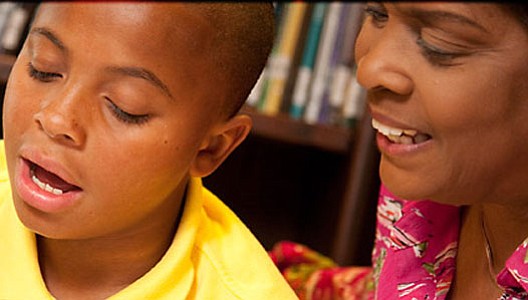BALTIMORE — Between 70 and 80 percent of individuals with poor reading skills in America are likely dyslexic and according to education and medical experts, as many as 20 percent of the population has a language-based learning disability.
For more than three decades, a Baltimore organization has been working diligently to teach low-income children and adults with dyslexia or other language-based learning disabilities to read.
The Dyslexia Tutoring Program in Southeast Baltimore has been training local volunteers to work in a program where they offer specialized tutoring consisting of at least 60 hours— on a one-on-one basis— to improve the skills, self-esteem and behavior of dyslexic youth. Since 1982, the program also has helped to raise awareness for the learning disability that many acknowledge that they’ve never heard of.
“Remember, you didn’t hear years ago about autism either and all of sudden one of the big company CEOs came forward and his grandchild had it and now you see so many things about autism,” said Marcy Kolodny, CEO of the Dyslexia Tutoring Program.
“When it came to dyslexia, everyone thought people were dumb or something else. But, those who are dyslexic are extremely intelligent and there are a lot of CEOs who are dyslexic and think outside of the box.”
Dyslexia can affect anyone regardless of race, social status, or economic status.
“It’s all over the world. If you suspect your child has a learning disability, the earlier you can get that child to a reading specialist, to a psychologist, to be screened and tested, the better it is so that the child can have remediation and avoid going through a lot of things,” she said.
With October the start of National Dyslexia Awareness Month, Kolodny and others from the program are hoping to attract more volunteers.
“We are tutoring over 200 individuals, children and adults, and all of our tutors are trained,” Kolodny said. “We have tutors from all walks of life. Judges, retired teachers and others and many become mentors and we have a lot of wonderful success stories.”
Dyslexia affects reading, writing, spelling and sometimes speech. The problems displayed by individuals with dyslexia involve difficulties in acquiring and using language, reading and writing letters in the wrong order. However, those are just some of the manifestations of dyslexia.
“There are a number of warning signs including having trouble reading fluently; reversing numbers and letters; a lack of awareness of sound in words or rhymes; difficulty in handwriting; spelling; oral or written comprehension or focus and delayed spoken words,” Kolodny said.
To help sufferers, the Dyslexia Tutoring Program also has a summer program, which provides students with the opportunity to increase their reading, spelling, and writing skills in a short period of time.
For the summer program, program officials send students to camps at The Jemicy School in Owings Mills, Odyssey School in Stevenson, The Gow School and Kildonan School in upstate New York, all private schools for dyslexic children. At camp, students improve their self-esteem and social skills, and receive four hours of one-on-one and small group instruction in the areas of reading, oral and written language, and math five days a week for five weeks, according to Kolodny.
“We send kids to camp for the first time and they’re not bullied or picked on by others,” Kolodny said.
On October 6, 2016, the local program will host its Wishes, Dreams & Imagination Gala at the Baltimore Marriott Waterfront Hotel where they’ll honor Calvin Butler Jr., the CEO of BG&E, and present their first annual Roger Saunders Memorial Award, named after the psychologist of international renown in the field of dyslexia.
Then, from October 13 to October 18, officials from the program will attend the Barnes & Noble Book fair at Woodholme Center that will feature a question and answer session and books about dyslexia and famous individuals with the learning disability.
Kolodny says it’s important to emphasize the need for volunteers for the Dyslexia Tutoring Program.
“We need volunteers. We get a number of people who’ll take our course and all of our tutors go through a background check,” she said. “We have three tutoring rooms and we partner with Sinai Hospital.”
To learn more about the program, find out more about the signs of dyslexia and to volunteer, visit: www.dyslexiatutoringprogram.org.
